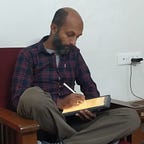Making choices
Over the past few years, there has been a steady output of productivity advice that owes its origin to neuroscience. ‘Neuro-plasticity’ as the phenomenon is called, suggests that habits can be installed in the brain by repetitive practice. The steady repetitions strengthen the neural networks and influences our choices, behaviours and skills.
The ancients figured this out many centuries before the morning routines of CEOs became the go to productivity hack for success. The ancients figured that through repetition and daily practice, changes could be brought about not only in the body, but also in one’s attitude and behaviour.
Fasting, a feature in the Lent period across various religions is one such practice. As we stand at the door step of the Great Lent (which lasts 50 days in the Eastern Churches), may I encourage you to see it as a practice that shapes us our mind and body.
The Lent features greater time spent with the Word of God and in worship; equal, if not more time spent in acts of kindness, seeking out those who are in need. It is a time of austerity, where we choose to mindfully give up those things that offer us comfort and convenience in our daily lives (this could include dietary habits and other conveniences of contemporary life).
The idea is that we spend more time contemplating the suffering of Christ on the cross and be part of it, by partaking in such suffering, by willingly giving up ‘the usuals’. The crucial aspect of our participation is that it is voluntary — chosen by oneself.
It is our choices which make us human. Today, I came across a video of locals in an Ukrainian village walking towards incoming Russian tanks. No one forced them. They chose it. It is an act of freedom in the middle of a disabling war.
Automating everything seems to be the name of the game today. Even as we seek to become effective by automating many habits through thoughtless repetitions, Lent restores to us what makes us human — a mindful choice. It is about the ability to choose what is best for those around us while giving up ourselves.
Jesus Christ reveals God in this way, in a way that it is possible to choose to die for love, to choose the best of others over our wishes, to defy the trend and be radically courageous because God has the big picture in mind. It is also a reminder that we are to stand with the weak, vulnerable and the suffering, because the Son of God identified with them and became one among them through which salvation is offered to the world — to all who are ready to receive it. It is yet another reminder that we can to resist being shaped by advertisements and VC funded marketing budgets that thrust products into our hands while leaking our bank accounts and our ability to think for ourselves.
A Christian theologian from the third century said that Jesus Christ reminds us that the finite body, with all its limitations, is capable of holding the Logos — the very principle that animates and gives life to our universe — whom John introduces in his first chapter of the Gospel as Jesus Christ, the Word who became flesh. And the Lent is such a time, when we willingly choose to walk the path of Christ so that we may grow to the very likeness of him as new creations. May the dark journey to Calvary always be lit by the lamp of hope of resurrection. A new you is possible. You do have a choice.
I leave you with the Lent prayer of St. Ephrem, the Syriac theologian from the fourth century:
“O Lord and Master of my life,
take from me the spirit of sloth, despair, lust of power, and idle talk.
But give rather the spirit of chastity, humility, patience, and love to Thy servant.
Yea, O Lord and King,
grant me to see my own transgressions,
and not to judge my brother,
for blessed art Thou, unto ages of ages. Amen.”
Blessed Lent.
